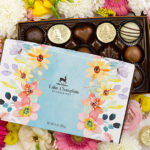
Last Thursday, before Emmy’s weekend, 25 Black Women in Beauty held their second private dinner at the luxe Crustacean Beverly Hills restaurant, which featured some of the most powerful black women executives, entrepreneurs and influencers in the beauty industry today. The private and exclusive dinner featured C-suite executives from Fenty Beauty, NARS Cosmetics, Estée Lauder, Neutrogena, L’Oreal Paris, Instagram, Lancome Paris, and notable actresses like Queen Sugar’s Dawn Lyen-Garder, Dear White People’s Ashley Blaine Featherson and Mix Ish’s Arica Himmel to name a few. Sponsored by Remy Martin XO, each dinner guest shared impactful introductions about their career trajectories and statements about their beauty journeys, creating an intimate and inspiring setting, which allowed guests to feel comfortable sharing their raw and honest experiences as women of color within the digital and beauty industries.
Launched on Juneteenth 2019, 25 Black Women in Beauty is a collective, thoughtfully conceived to serve as an elevated platform for accomplished and driven black women executives, entrepreneurs and influencers in the $600 billion global beauty industry. It serves to highlight these immensely talented women to increase their presence at the C-suite level and beyond, as well as encourage and support the creation and success of indie brands invented by black women entrepreneurs.
Created by beauty industry executives Cara Sabin, Vice President of Marketing, NARS and Ella T. Gorgla, previous Executive Director of Strategic Initiatives & Corporate Innovation at Estee Lauder Companies, 25 Black Women in Beauty’s mission is, to celebrate, elevate and promote black women in the beauty industry through constructive, intentional collaboration and networking while inspiring one another toward collective greatness. 25BWB understands that women of color represents a huge financial opportunity for the beauty industry. In beauty specifically, the spending power of black women in the US is a staggering $7.5B according to an Essence study, which is 80% more in cosmetics and twice as much in skincare versus non-Black consumers. A 2018 Nielsen study also spoke to the sheer influence of black women noting that “Black consumer choices have a ‘cool factor’ that has created a halo effect, influencing not just consumers of color, but the mainstream as well.”

Yaneek Proctor, NARS Cosmetics, Holly Cann, Fenty Beauty, Uzo, NARS Cosmetics, Dawn-Lyen Gardner, Queen Sugar, Cara Sabin, NARS Cosmetics
25BWB
In addition to their event series, 25 Black Women in Beauty also offers a specialized membership and career board for African-American women who are interested in breaking into the beauty industry. Ahead of the dinner, we spoke with founders Sabin and Gorgla about the importance of the event series, their thoughts about the need for diversity within the beauty industry and what’s next for 25BWB.

Karen Civil, CEO AlwaysCivil, Jackie Aina, Beauty Influencer
25BWB
Dominique Fluker: Share your career journeys. What led you to a career in beauty?
Cara Sabin: After beginning my career in traditional CPG over 20 years ago, I was quickly drawn to beauty because of the consumer psychology involved with such an intimate and personal category, incredibly fast pace, and the dynamic cycle of innovation. It’s a space that lets you express yourself creatively, analytically, and strategically.
Ella Gorgla: My background is somewhat non-traditional. I’m an Industrial Engineer by training and spent the better part of my career as a Management & Strategy Consultant. However, I’ve always been beauty-obsessed and when the opportunity came along for me to consult within the Beauty industry, I took full advantage of it – quickly turning it into a full-time opportunity.
Fluker: Speak about your experiences as being black women within the beauty industry. Have there been any trials and tribulations?
Sabin: The challenges we’ve faced are what black women face in virtually any industry – the compounding effect of intersectionality – being both a woman and a black person; as well as the dearth of representation at the most senior and executive levels of our industry, which we know can impact one’s ability to get recognized, rewarded and promoted. Statistics show (*McKinsey 2018 Study, Women in the workplace*) there’s a disparity in the rate of promotion of Black women at 60% vs. their male counterparts 100% and vs. White women at 84%. Factors that contribute to this could be unconscious bias, lack of advocacy at the senior management level or the “emotional tax” that black women pay being one of the few or the only as she ascends up the corporate ladder. That’s not unique to beauty. But what is unique to beauty is it’s an industry that’s rich with subjectivity and emotion– it’s very personal. As Black women, we’ve often had to compartmentalize our identity and culture or code switch when we come to work. What’s exciting now is we’ve reached a powerful inflection point where there’s greater awareness, appreciation, and value placed on inclusivity and how our perspective can help shape and grow the industry.
Fluker: What can the beauty industry do to further increase diversity and inclusion?
Gorgla: Honestly, what the industry can do is just that – do. We know our consumer base is becoming more diverse, more multi-cultural – so our board rooms, C-suites, makeup labs -all elements of the industry should reflect that.
Fluker: What inspired you to create the 25 Black Women in Beauty dinner series? Why did you all launch the series on Juneteenth?
Sabin: We were inspired because we personally have friends and colleagues across this industry who are making an impact and doing amazing things but not getting the recognition they deserve. Out of self-love for black women, we wanted to create something for ourselves. The idea of launching on Juneteenth tied into the concept of emancipating ourselves from the idea of needing external recognition and validation. We know we’re dope so we wanted to recognize that greatness in each other.
Fluker: The 25 Black Women in Beauty dinner series’ mission is to celebrate, elevate and promote black women through constructive, intentional collaboration and networking while inspiring one another towards collective greatness. How is this series making an impact?
Gorgla: Even though our organization is nascent, we’re already seeing the organic networking and collaboration happen. Business deals are being made, some of our members with executive experience are freelancing to help some of our entrepreneurs, and we’ve seen a strong response to women across the country want to sign up and join our collective to help further our mission.
Fluker: Earlier this year the inaugural dinner was held in NYC at the Whitby Hotel. Why did you all decide to bring the series out to Los Angeles?
Sabin: When we target a city for our dinner series we consider the development of the beauty industry in that city, both at the corporate level as well as the number of indie brands. And we also think about the concentration of professional black women. Los Angeles naturally checks those boxes but also has a symbiotic relationship with the entertainment and music industries. We chose this week as a lead into Emmy’s weekend which will hopefully recognize the breadth of talented women of color who made an impact this past year.
Fluker: The 25 Black women in beauty website offers a career board where members can find open high level and desirable positions in the beauty industry. What was the intention behind listing jobs in the beauty industry?
Gorgla: To fulfill our mission of elevating and promoting black women in beauty it was necessary to facilitate the access to jobs via a career board. Advancing your career is all about networking and that’s part of the value we hope to bring to the women in our collective.
Fluker: What’s next for the 25 Black Women in Beauty collective? Where do you see it expanding within the next 3 years?
Sabin: We want to be the single largest professional network for Black women in the beauty industry and ultimately, the success of our impact will be proven by seeing increased numbers of black women at the C-suite level, on corporate boards, and successful entrepreneurs.
Fluker: Give your best piece of advice for the upcoming black women in beauty.
Gorgla: Keep shining because we need you and we see you.
[“source=forbes”]










